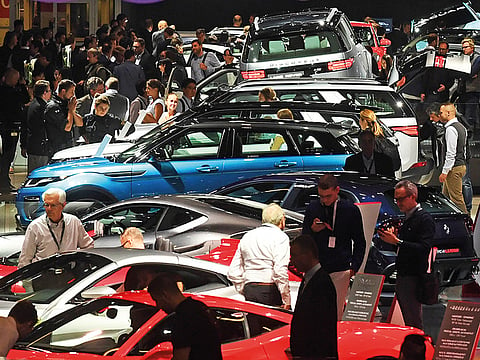European car market revs up in summer
Carmakers see promise of bonanza in eastern Europe

FRANKFURT AM MAIN
As Frankfurt’s IAA auto show gets under way, European carmakers are looking to the continent’s east for growth, where increasing numbers of people are wealthy enough to afford their own wheels.
“It’s the east that’s really driving Europe,” said industry expert, Laurent Petizon of AlixPartners.
Car sales there increased 14 per cent year-on-year in the first three months of 2017 alone, to almost 700,000 vehicles, market research firm Jato found.
Poland saw sales grow by 15.5 per cent to 277,000 vehicles in the same period, making it Europe’s seventh-largest car market.
Over the whole year 2017, sales are expected to reach a new record of 1.3 million in a region stretching from northerly Estonia to Bulgaria on the Black Sea — up 10 per cent year-on-year.
That’s a slight slowdown from the 16 per cent recorded in 2016, industry expert Ferdinand Dudenhoeffer of the Duisburg CAR institute noted, but a great deal more dynamic than the 3.0 per cent expected in western Europe.
“Economic growth in the region and the relative lack of market saturation in motor vehicles are the factors underpinning” growth in the east, he said.
Especially in Romania and Bulgaria, which have been members of the European Union for just 10 years, “there remains lots for room” to catch up, Petizon agreed.
Customers’ curiosity
Sales have grown hand-in-hand with carmakers’ increasing investments in factories in the region, as massive multinationals chase lower labour costs than in western Europe.
Skoda, native to the Czech Republic, is far from the only manufacturer at home in the east, but remains the market’s biggest player, with a 17-percent share of sales.
It is a subsidiary of German giant Volkswagen, whose own-brand cars and Japan’s Toyota hold second and third place respectively.
But competition comes from Renault-Nissan’s Dacia brand, whose manufacturing presence in the region is a factor in some buyers’ choice.
Peugeot parent company PSA has secured its own eastern foothold with the recent takeover of Germany’s Opel, including factories in Hungary and Poland.
And Jaguar Land Rover plans to open a one-billion-euro (Dh4.41 billion; $1.2 billion) factory in Slovakia in 2018.
From further afield, Korea’s Kia and Hyundai joined forces to set up shop in the Czech Republic and Slovakia, garnering a double-digit market share in each country.
Unlike in western Europe, eastern European markets had not yet reached maturity, so consumers there were still “curious about everything arriving on the market”, said Kia Europe chief Michael Cole.
That has made it easier for Kia to claim a six-percent share in eastern Europe, not least thanks to its Sportage crossover — a popular model in a sought-after segment.
SUV sales saw 32-percent growth in eastern Europe over the first half of 2017, compared with 10 per cent for other segments, accounting for almost one-third of cars registered on the region’s roads.
But the region isn’t completely out of sync with its western neighbours: diesel sales have sputtered in the wake the emissions cheating controversy, accounting for 37 per cent of sales, down from 40 per cent a year earlier.
‘Crucial’ diesel
The dieselgate crisis erupted at the height of the last IAA in 2015 when Volkswagen stunningly confessed to installing cheating software in 11 million diesel cars worldwide designed to dupe pollution tests.
In reality, the cars were spewing up to 40 times the permissible levels of toxic nitrogen oxides (NOx).
Similar suspicions have since spread to other carmakers, highlighting just how much the industry has resorted to skirting the rules, or outright cheating, to cover up high NOx emissions.
The scandal deepened in July on reports that Daimler, BMW, Volkswagen and its Audi and Porsche subsidiaries for years colluded on technical specifications — including emissions technology.
The revelations prompted some 70 cities, including the car industry bastions of Stuttgart and Munich, to consider banning dirty diesels from their smog-clogged roads, fuelling concern among drivers.
— AFP



